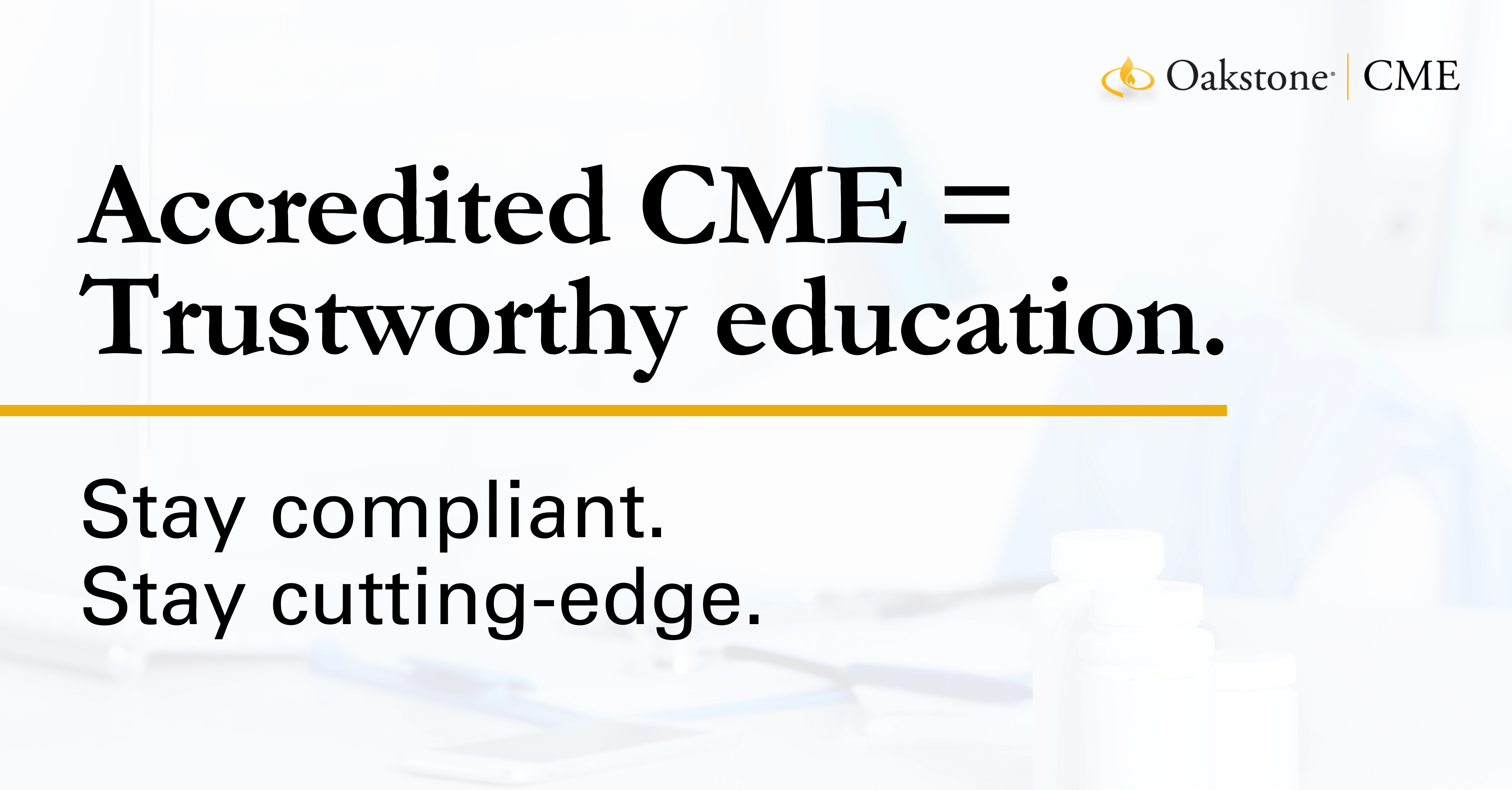What to Consider When Selecting Medical Continuing Education

As a physician, you're constantly juggling patient care and administrative tasks with personal demands and the drive to stay current on the latest medical developments. Amid all this, finding time for continuing medical education (CME) might feel overwhelming. It’s easy to default to the growing stack of medical journals on your desk when time is limited. But taking care to select medical continuing education programs that fit your unique needs can make the learning experience far more valuable.
In a field where advancements evolve quickly, selecting CME providers that prioritize learner competence and the latest knowledge is crucial to delivering the best patient care. According to the Accreditation Council for Continuing Medical Education (ACCME), competence is the top outcome of of CME activities, followed by knowledge and performance outcomes.
But with the overwhelming number and types of CME programs out there, it’s challenging to narrow down the best learning opportunities for you. Explore some of the top factors to consider when evaluating and selecting medical continuing education providers so you can grow while providing top-quality care for your patients.
Expertise and Credibility
A strong CME program starts with the authority, expertise, and credibility of the provider. Evaluate the expertise behind the program to ensure you are learning from trusted professionals backed by reputable institutions.
Partnerships With Top Medical Institutions & Societies
Look for CME providers who partner with leading institutions like Harvard Medical School or UCSF School of Medicine or societies such as the American College of Physicians. Such partnerships ensure high-quality, evidence-based content, keeping you current with best practices so you can improve patient outcomes.
Qualified Instructors With Practical Experience
Your instructors should be experienced professionals with hands-on expertise in the topics they teach. The more experienced the instructors, the more value you gain from the content.
Evidence-Based Content
Choose a CME provider that offers evidence-based courses aligned with the latest research and best practices. This helps you stay on the cutting edge of medical advancements and make informed clinical decisions.
Relevance and Practicality
CME should not only meet professional requirements, but also provide meaningful improvements to your clinical skills. CME activities should contribute to clear learning objectives that support your daily practice.
Specialty-Specific Content
Your CME should address pressing issues in your specialty, whether that’s primary care, cardiology, or emergency medicine. The right CME provider keeps you updated on new treatments and guidelines, as well as strategies relevant to your field.
Programs that offer curated content tailored to specific specialties can greatly enhance your learning experience. Curated CME activities save you time by focusing on the most relevant information for your practice, allowing you to cut through the overwhelming number of options and concentrate on what truly matters. By selecting a CME provider that carefully curates its content, you invest in a learning experience that’s both efficient and highly relevant to your professional needs.
Practical, Actionable Insights
A great CME program equips you with information or techniques you can immediately apply through practical educational activities. Whether it’s a new protocol or improved patient interaction, the best programs offer actionable insights that impact your daily work so you can implement changes right away.
Case-Based Learning
Case-based learning, or learning rooted in real-world scenarios, is highly effective for reinforcing knowledge application. This method is generally preferred by medical students, and that value carries over across their careers. Case-based learning caters to different preferred learning styles of healthcare practitioners, making it more adaptable and applicable to individual needs. Look for CME programs that use case-based learning to bridge the gap between theory and clinical practice, making complex concepts more applicable to patient care.
Variety of Continuing Education Formats
Flexibility is key. As a busy healthcare professional, you need CME activities that fit into your schedule, cater to diverse learning styles and preferences, and provide real-world benefits that enhance your daily practice. By choosing CME formats that align with your specific needs, you can make the most out of your continuing education experience and ensure it’s both manageable and high-impact.
Live, In-Person Events
Live events like conferences and workshops provide immersive learning experiences and opportunities to interact with experts and peers. These events are perfect for gaining comprehensive knowledge on critical topics, and allow you to get several hours’ worth of learning in one dedicated time-frame.
On-Demand, Self-Paced Options
On-demand options like online courses and podcasts offer the flexibility to learn throughout the day, such as during commuting time or exercise sessions. These formats let you learn at your own pace, making it easier to stay current without compromising your work-life balance.
Diverse Content Lengths
A good CME provider offers various content lengths. Whether you need an intensive, in-depth lecture series, multi-day course or a 15-minute podcast, having options allows you to engage in continuing education in a way that fits your schedule.
Convenience and Accessibility
A CME provider that values your time will offer convenience in every aspect of their services, benefiting healthcare practitioners by making continuing education more accessible, even at your busiest.
User-Friendly Platform
A mobile-responsive, user-friendly platform allows you to engage in CME during free moments, such as between patient rounds or at home. Look for platforms with seamless navigation and an intuitive user experience.
Easy Credit Tracking
Managing a high volume of different regional, institutional, and specialty CME credits can be a hassle. The best programs let you earn and track credits directly on the platform, ensuring compliance with institutional and state requirements without extra effort.
Responsive Customer Support
Responsive customer support can significantly improve your CME experience by ensuring you can access your CME platform when you need to or keeping you informed during outages. Look for providers that offer timely assistance to make sure you get the most out of your education.
Accreditation and Certification
Accreditation is a cornerstone of high-quality CME. Accreditation signifies that the course content meets rigorous standards and is recognized by reputable organizations. This ensures healthcare practitioners receive high-quality, relevant education that enhances their practice. Accredited CME activities are crucial for staying updated with evidence-based advancements and meeting professional requirements, which ultimately benefits both you and your patients.
Accreditation From the Accreditation Council for Continuing Medical Education (ACCME)
Make sure your CME provider is accredited by the Accreditation Council for Continuing Medical Education (ACCME). ACCME accreditation means the program meets high standards for educational quality, which is crucial for maintaining your license and professional standing.
Alignment With Medical Board Requirements for Professional Development
Your CME should align with the requirements of your medical board and any other professional organizations you belong to. This alignment ensures that the time and effort you put into your continuing medical education will fulfill all necessary criteria for ongoing certification and professional development.
Seamless Credit Management and Reporting
In addition to ACCME accreditation, look for providers that offer seamless credit management and reporting. This can save you considerable time, especially when it's time to renew your license or submit documentation for your hospital or health system.

Cost and Value
Cost is an important consideration, but it’s the value that ultimately matters most. The right CME should be worth the investment of both your money and your time.
Transparent Pricing
Select CME providers that offer transparent pricing. This allows you to understand exactly what you’re paying for and ensures there are no hidden costs. Being upfront about pricing also builds trust and helps you make a more informed decision.
Long-Term Learning Return on Investment
Your CME’s return on investment (ROI) goes beyond simple maintenance. Also assess whether the skills and knowledge you gain from a CME program translate to long-term benefits in your clinical practice. Consider how CME can improve your abilities, improve patient outcomes, or open new career opportunities.
Comparison Across High-Quality CME Programs
Finally, make sure to compare different CME programs to guarantee you’re getting the best quality for your investment. Comparing the scope of the course content, instructor qualifications, and potential career benefits will help you make the best choice for your continuing education needs.
Invest in Your Practice by Selecting the Right Medical Continuing Education
Choosing CME is about more than just fulfilling state requirements or collecting credits. It’s about enhancing your skills, improving patient outcomes, and advancing your career in a way that works with your schedule and professional goals. By focusing on expertise, relevance, accessibility, accreditation, and value, you can select the best medical continuing education provider that aligns with your needs as a healthcare professional.
Remember, investing time in selecting medical continuing education wisely is ultimately an investment in your future, your patients, and your practice.
Want to learn more? Discover the Oakstone advantage.
